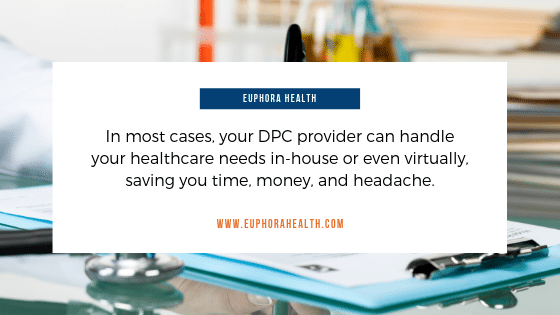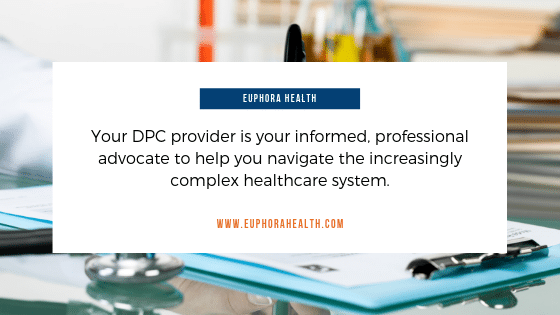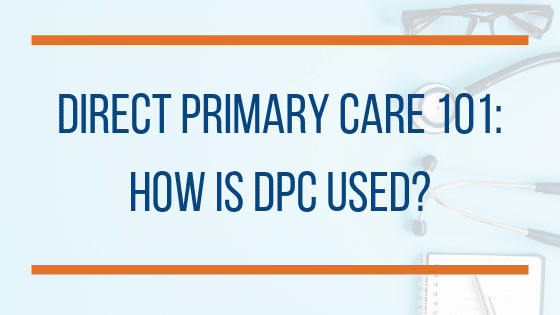Many patients who are new to the idea of Direct Primary Care (DPC) wonder, When and how would I use DPC? Give me some concrete examples. Since DPC is unique and differs significantly from insurance-based care, this question is worth digging into. In this two-part series, we’ll share some stories that illustrate how patients use DPC, and how a close bond between a DPC provider and a patient can lead to lower costs, higher efficiency, and better health outcomes.
Part one examines how the DPC model positions your doctor as your advocate and your personal healthcare expert, especially at times when you need quick care. Part two takes a close look at how Direct Primary Care can improve outcomes for chronically ill patients and individuals who need specialized care.
First, Call Your Doctor
Let’s start with the most elemental contrast between insurance-based care and Direct Primary Care: you have easy access to your care provider. This simple concept is one of the cornerstones of DPC, and it makes all the difference. The first answer to “When and how would I use DPC?” is “Always, by contacting your DPC provider first.”
In traditional healthcare, the patient has been trained to self-refer. This means when you’re suffering from a cough that just won’t go away or are developing an uncomfortable infection, your first instinct isn’t to call a trusted care provider. Instead, your first instinct is to Google the nearest walk-in clinic and maybe scroll a few reviews before choosing where to go. You don’t have much guiding your decision in this instance besides past experience (“Remember how that clinic had a two-hour wait time and the bill was astronomical?”) or a few online comments, (“Avoid this place at all costs!”).
There’s Another Option: The DPC Way
When you’re a DPC patient, you have a knowledgeable healthcare insider on your side. Instead of self-referring for that nagging cough or urinary tract infection, you can text or call your doctor. You explain your symptoms, and your care provider—someone who you know well and who understands your medical history—helps you make a decision. In most cases, your DPC provider can handle your healthcare needs in-house or even virtually, saving you time, money, and headache.
DPC is available for routine healthcare needs—even issues often assigned to “urgent care”—as well as chronic issues. In insurance-based care, you would see your primary care doctor when you’re in for regular visits, but urgent issues for same-day or next-day appointments are generally handled by a nurse practitioner or your doctor’s partner. Instead of seeing your most trusted care provider when you’re ill, insurance-based care often forces you to see someone you have little to no history with. On top of this, for any issue besides very basic issues, insurance-based care patients are often referred out to specialists, adding additional costs, redundant tests and appointments, and stress. DPC brings all of these visits back to your primary care provider, which is where they should be.

Here’s why: your primary care provider is trained in a broad scope of care and they know your history well. Since your primary care provider is an expert on common problems—and most people experience common problems—the doctor you know best should be handling the majority of your healthcare needs. It’s simpler, faster, and more efficient.
Your DPC Provider is Your Advocate
Insurance-based care creates a barrier between the provider and the patient. It’s rarely intentional, especially on the provider’s side, but it is a reality of modern healthcare. For instance, if a physician spends an extra fifteen minutes with a patient at her morning appointment, the day’s schedule is thrown off, and patients are spending more and more time in the waiting room. This is one of the ways insurance-based care can cause misaligned incentives between patients and their care providers: a physician will often choose to refer their patient to a specialist, even for a procedure or test that could take less than 20 minutes, simply because of their own schedule constraints.
In contrast, a DPC provider is accessible to patients via text message, phone call, and in office visits, and can strive to keep all routine and even specialized care in-house. Let’s take a closer look at the ways DPC offers a personalized approach to healthcare that improves a patient’s overall experience.
DPC for Routine and Acute Healthcare Needs
One of the common ways patients use DPC is for acute and routine healthcare needs. This is your garden variety problem: you suspect you have strep throat, or you’re suffering from yet another urinary tract infection, or you’re experiencing a skin issue. In these cases, you have three options with your DPC provider:
- Text your provider
- Call your provider
- Come into the office
For many routine issues, a remote consult and diagnosis is an option. Especially when your care provider is familiar with your health history, a virtual appointment can give you the care you need without the hassle. There’s no need to leave work or pack the kids up in the car or deal with traffic. When your physician knows you well, they may be able to identify what you need over the phone in a few minutes and provide swift, personalized, effective care.
The DPC Same-Day Appointment Experience
For acute issues, same and next-day appointments are always available through your DPC clinic. From there, the experience is much different than your typical urgent care clinic.
When you walk in, you’ll skip that routine 20-45 minutes (or more) in the waiting room (something tells us you won’t miss Jeopardy reruns or catching up on the latest People magazine issue). You’ll be greeted at the door by staff members who are expecting you and who know you by name. You’ll go directly into the exam room and having a visit with your provider within a few minutes.
During this exam, you won’t be rushed. You’ll have time to ask questions and discuss your concerns. You’ll receive no-cost or low-cost tests, such as strep, mono, and pregnancy tests. If you go home with a medication, your cost will be shockingly minimal compared to insurance-based care: in DPC, we call it “pass-through” costs. Essentially, we’ll be giving you medication and durable medical equipment (DME), such as splints, for barely above our own cost. This means a patient could receive a splint at a same-day appointment for as little as $10-$15.
A Confident, Informed Referral
If you’re experiencing an urgent healthcare need and you can’t get into your DPC physician right away, your provider can help you find the right place to go. For instance, if your need can’t wait until the morning and it’s already 9:00 pm, you can text your DPC provider and ask advice on how to proceed. Your doctor could coach you through how to stabilize an injury through the night to avoid the emergency room or help you decide how serious your condition is in the moment. Then, your DPC provider can provide an insider’s perspective on how to seek care.
This story illustrates how having an “insider” with extensive knowledge of healthcare on your side could save thousands of dollars.
A Euphora Health patient’s one-year-old child fell forward and suffered a lip laceration. Still thinking in terms of traditional healthcare, the (understandably panicked) mother rushed her child to the nearest pediatric urgent care facility. In this office, the wait was long and the appointment was stressful. The on-staff care provider was unwilling to repair the laceration, concerned with the cosmetic pitfalls of handling facial repairs. The care provider chose instead to recommend a plastic surgeon to the mother for reconstructive surgery. At this point, the ordeal was already costly and long, while a child with pain and a tired parent navigated the healthcare system alone.

Around 10:00 pm, the mother sent a text with a picture of the child’s lip to her DPC physician, letting him know the situation. Her DPC provider commiserated and let her know of a different option: just minutes away by car, another urgent care was available that confidently handled procedures like this all the time in-house. The physician was familiar with this urgent care and trusted the physicians on staff. This clinic could provide a fast, affordable, high-quality repair for the laceration without the need for sedation or a plastic surgery appointment. The weary and overwhelmed mother, having already been referred to the plastic surgeon, chose the surgery—understandably, she was already in the thick of it and exhausted. Thousands of dollars and a day later, her child’s cut was repaired, but in a much more stressful, expensive, and invasive way than it could have been had she simply started by texting her DPC provider. The child underwent sedation instead of simple numbing, and the parent was handed a hefty bill.
A DPC provider can give you more than only in-office visits and as-needed care: they’re also your informed, professional advocate to help you navigate the increasingly complex healthcare system.
DPC Makes a Difference
Direct Primary Care is different—because of the close relationship between doctor and patient, we can reduce costs, mistakes, and redundant exams or tests. The upsides of working with a provider who knows you well cannot be stressed enough. The more care we can keep in-house with your primary care provider, the better the outcomes and the safer patients are. We’re proud to support our patients through all of their healthcare problems and needs, whether they’re suffering from an acute and urgent issue, a chronic disease, or a special case.
Still have questions? Call us today to set up a consultation. We’re happy to help.

